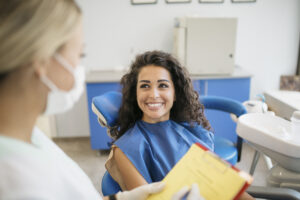
Exercise is important to good health, but can it have a detrimental effect on our teeth? Studies have shown that exercise and fitness habits can sometimes result in an increase in dental decay and tooth erosion. Exercise can impact our oral health in the following ways:
Increased Risk of Dry Mouth
Breathing heavily through the mouth during exercise can result in a reduction in saliva and can cause the mouth to dry out. Dehydration can also cause decreased production of saliva. Saliva is filled with minerals that work to fight bacteria, protect tooth enamel, and prevent tooth decay. To prevent decay caused by a dry mouth, learn to breathe through the nose during exercise and hydrate with water before, during, and after your workout. You can also brush your teeth before you exercise to reduce the presence of bacteria and plaque. A daily alcohol-free fluoride rinse will protect the demineralization of your teeth that can occur with decreased saliva production.
Change in Clenching and Grinding Habits:
Athletes often clench their jaw when straining to lift weights. This pressure can result in wear and even crack teeth. To protect teeth from the effects of clenching, consider using a mouthguard. These can be purchased at most drugstores or sporting goods stores or we can make a custom fitted mouthguard for you.
Consumption of Sugary Drinks
Studies have shown that sugary sports drinks are up to 30 times more erosive to the teeth than water. The citric acid they contain can soften the tooth enamel so much that even brushing can cause tooth damage. Taking frequent, small sips of sugary liquids increases the chance of tooth decay. Avoiding the use of sports drinks and hydrating with water instead can prevent these negative effects. If you feel you must use sports drinks, don’t drink small amounts over an extended period of time, rinse your mouth with water afterwards, and avoid brushing immediately after consuming. There are sugar-free or low sugar electrolyte drinks available as well.
For additional information on protecting your teeth during sports or exercise, our Oral Surgeon Downers Grove office is always here to help.
Chicago Dental Implants, Oral & Facial Surgery
Phone: (708) 301-5000
Url: https://chicagodentalimplants.com/
10713 W 159th Street
Orland Park, IL 60467







